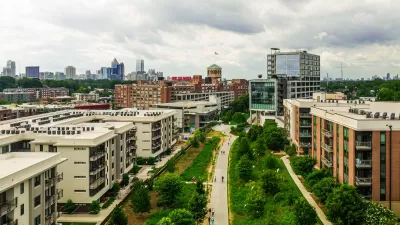Cities have to prioritize displacement as a policy issue if they want to achieve inclusive growth, writes David Whitehead.

As pro-growth and anti-gentrification advocates clash in cities across the U.S., Greater Greater Washington contributor David Whitehead suggests that one way to bridge the divide is by addressing the displacement caused by new development.
"The goals of redeveloping affordable homes, building more homes overall, and maintaining a clear path for original residents to return do not have to be at odds," he writes. If combined with tenant protections and preservation efforts, he argues, growth and redevelopment can be managed in a way that "does not pit the needs of our burgeoning population and the needs of more vulnerable residents against one another."
D.C.'s Comprehensive Plan—not uniquely—doesn't define any policy tools or funding mechanisms aimed at preventing displacement. To fill that gap, Whitehead lays out the principles behind a policy package proposed by the GGW team.
The package suggests new policy tools to preempt a few of the ways that new developments can directly cause displacement. Recommendations include requiring one-to-one replacement of affordable units in new developments, as well as build-first policies, in which existing apartments are not demolished until their replacements are ready. Funding proposals include:
…allowing zoning flexibility to build a taller building, using some of the profit generated from those extra units to subsidize in-house lower-cost units. That might mean expanding voucher programs like DC’s Low Rent Subsidy Program (LRSP), to help meet the gap between what families can afford and what it costs to build a low-cost home.
For more perspectives and debate on these ideas, look no further than the comments.
FULL STORY: DC’s Comprehensive Plan needs to treat displacement as a serious problem

Planetizen Federal Action Tracker
A weekly monitor of how Trump’s orders and actions are impacting planners and planning in America.

Maui's Vacation Rental Debate Turns Ugly
Verbal attacks, misinformation campaigns and fistfights plague a high-stakes debate to convert thousands of vacation rentals into long-term housing.

Restaurant Patios Were a Pandemic Win — Why Were They so Hard to Keep?
Social distancing requirements and changes in travel patterns prompted cities to pilot new uses for street and sidewalk space. Then it got complicated.

In California Battle of Housing vs. Environment, Housing Just Won
A new state law significantly limits the power of CEQA, an environmental review law that served as a powerful tool for blocking new development.

Boulder Eliminates Parking Minimums Citywide
Officials estimate the cost of building a single underground parking space at up to $100,000.

Orange County, Florida Adopts Largest US “Sprawl Repair” Code
The ‘Orange Code’ seeks to rectify decades of sprawl-inducing, car-oriented development.
Urban Design for Planners 1: Software Tools
This six-course series explores essential urban design concepts using open source software and equips planners with the tools they need to participate fully in the urban design process.
Planning for Universal Design
Learn the tools for implementing Universal Design in planning regulations.
Heyer Gruel & Associates PA
JM Goldson LLC
Custer County Colorado
City of Camden Redevelopment Agency
City of Astoria
Transportation Research & Education Center (TREC) at Portland State University
Jefferson Parish Government
Camden Redevelopment Agency
City of Claremont





























